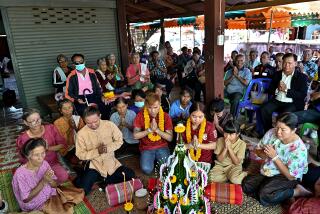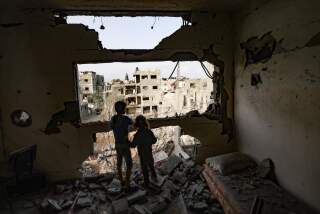Life Goes On : Families of Reservists in the Gulf Muster Strength in Trying Times
- Share via
Marcello Isaac, holding his 1-year-old son in his lap, managed to chuckle about his predicament.
His wife, an Air Force reservist, was sent to Saudi Arabia almost two weeks ago--leaving Isaac alone to care for their toddler and a 13-year-old son.
It wouldn’t be quite as bad, Isaac said, if it were not for the fact that he is also a reservist. He wonders when he’ll be called to active duty.
“We would just have to adjust,” said Isaac, a self-employed plumber. He laughed and shook his head. “We’ll figure out something.”
Since the Middle East crisis started six months ago, Ventura County residents whose loved ones have been sent to the Gulf have been facing problems of their own on the home front.
Some have been put in financial binds after losing the principal wage-earner to military duty--forcing family members to take on extra jobs or refinance their homes.
Few have escaped the loneliness and fear of having a loved one in a war zone. But how the families of reservists choose to deal with their plights varies from household to household.
Isaac said he likes to think that his wife, Zelmira, is away on vacation instead of on military duty in Saudi Arabia, where she is serving as a legal assistant.
The 41-year-old Oxnard man said he is confident that his wife will return home soon. But if she doesn’t, “everything will be all right,” he said.
But despite Isaac’s positive attitude, his 13-year-old son, Marcello Jr., said he is worried. “It’s scary,” he said. “I told her to be careful and come back soon. . . . I miss her waking me up in the morning when I oversleep.”
Marcello Jr. teases his father about his approach to reading mail from the military.
“He holds it up to the light before he opens it,” Marcello Jr. said. So far, no orders for his father have arrived.
If Isaac is activated, he’ll have to send his children to stay with relatives, he said.
Meanwhile, Isaac--whose wife worked as an investigator for the Ventura County coroner’s office--hurries home every day from work to pay the baby-sitter, fix dinner and look after his children. He said he avoids the evening news and falls asleep early, exhausted.
Anticipating hard times ahead, Janette Bull--whose husband, Larry, is en route to the Persian Gulf with the Coast Guard--has taken two jobs and refinanced their house to make ends meet.
Under the Soldiers and Sailors Civil Relief Act, she was able to get a 6% mortgage loan.
In addition, Bull, whose husband worked as a sheriff’s deputy, could be getting a boost from Ventura County.
On Tuesday, the Board of Supervisors will discuss whether county employees serving in the Persian Gulf will get pay to bring their service checks up to their former county salaries. Last week, Simi Valley became the first jurisdiction in the county to approve such a plan.
Despite her financial troubles, Bull said, “the greatest hardship is that I’ve lost my best friend. He was always home, and he loved to talk, nonstop. That’s what I miss the most.”
What little time she is at home, she watches TV news, she said.
“I’ve been waking up a lot in the middle of the night,” Bull said. “I just leave the TV on, so I’ll always know what’s happening.”
Keeping busy often helps soothe the pain.
Dorothy Lee’s husband, Harry, left for the Middle East at the onset of the crisis in August to, among other duties, help train the troops about the culture of Saudi Arabia.
Dorothy Lee, a teacher at Will Rogers Elementary School in Ventura, tries to make the best of the situation--she shares her family’s experience with the students in her fifth-grade class.
She brings in letters from her husband, a Marine reservist, for the children to read. She tells them about the climate and religion of the area. They are most curious about the camels, she said.
In a corner of the classroom, she keeps a Saudi Arabian flag, several post cards and a copy of the Koran--all sent to her by her husband. An Arabic clock, which keeps the time in Saudi Arabia, is propped up on a table against a wall.
“It helps to share with the kids,” said Lee, who is also a member of the state Board of Education. “I enjoy that, and they’re really interested, too.”
Lee said her husband, who normally holds a civilian job in public affairs at the naval Pacific Missile Test Center at Point Mugu, has been a Marine reservist for 36 years.
He has assured her that he is in a safe location in the Middle East, she said.
“He said he’s not at a strategic target,” she said. “I don’t think anyone is interested in bombing his little sand dune, because there’s nothing there.”
Still, she worries, especially when she has not heard from her husband for awhile.
“I try not to think about it,” Lee said. “I keep busy, and I get a lot of support from my co-workers. I never come to the classroom feeling down.”
But staying optimistic is not always easy.
Carol Toberman said her heart skipped a beat when she heard that a C-130 transport plane had been shot down in enemy territory. Her husband, Steve, an Air National Guard reservist working as an air-evacuation medic near the Kuwaiti border, is assigned to a C-130.
“Steve could be on any one of those planes,” Toberman said. But, luckily, he was not on the ill-fated mission last week, in which 14 Americans were reported missing.
Nevertheless, Toberman, also an Air National Guard reservist, expects that the worst is yet to come. “Just wait till the ground war starts,” she said. “There will be a lot of losses.”
But despite the danger, she said, she’s ready to help if she’s called to active duty. Her mother, Betty Butcher, recently moved into the couple’s Oxnard home to take care of their two daughters, ages 3 and 8, in case Toberman is also sent overseas.
Toberman works at the Channel Islands Air National Guard Base in Port Hueneme, setting up flights and fielding calls from relatives of reservists in the Gulf.
Toberman tries to keep busy with her job and her family. But after she puts her children to bed and the house is quiet, the loneliness sets in.
She said she sits listening to the family’s two dogs howl outside. The animals miss Steve, who left for the Middle East in January, she said.
Her mother reassures her. “Steve’s ornery. He promised me he’s coming back.”
Toberman nods. “Each person has to believe that their family or friends are coming back,” she said. “I have a lot of confidence in the military.”
Her daughters seem to be taking the situation well.
“I’m not worried about him,” daughter Shanna, 8, said of her father. “He’s big. He can take care of himself.”
Toberman said she finds comfort in knowing her husband is doing what he enjoys.
“They’ll land those 130s, sometimes on packed sand,” she said. They then jump out and pick up injured soldiers for transport to hospitals, she said. “Those guys are crazy, and they love it.”
More to Read
Sign up for Essential California
The most important California stories and recommendations in your inbox every morning.
You may occasionally receive promotional content from the Los Angeles Times.













